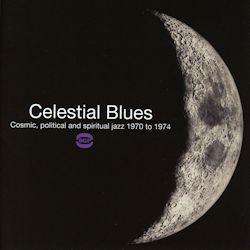 BUY NOW AmazonUK AmazonUS |
Celestial Blues Cosmic, political and spiritual Jazz 1970 to 1974
|
Gary Bartz NTU Troop – Celestial Blues
Joe Henderson and Alice Coltrane - Fire
Azar Lawrence - Warriors Of Peace
Charles Earland - Brown Eye
Roy Brooks - The Free Slave
Joe Chambers - The Alomoravid
Carlos Garnett - Let Us Go (To Higher Heights)
Bayeté Umbra Zindiko - Let It Take Your Mind
Hampton Hawes - Joise Black
Oliver Nelson – Aftermath
Recorded 1970-74
This is a compilation of the ‘back to the groovy source’ kind. The emergence recently of Kamasi Washington’s album The Epic has encouraged a new look at the so-called spiritual jazz of the late 1960s and early 70s. It was only decades later that collectors revisited these post -bop and free-ish albums and with the breakout Washington now hugely popular, it accounts to a large degree for this disc. The tracks here must have even subliminally infused Washington’s musical highway and so BGP can certainly be commended for their perspicacity in track selection: it’s not easy to whittle things down to a representative ten.
The title track is also one of the best known of the ten, its repetitive grooves and rhythmically propulsive patina, Coltrane-infused as it is, setting things up nicely. It’s good to be reminded of Gary Bartz’s hard hitting alto playing and Andy Bey’s vocals. One thing never to overlook in these tracks is the stellar nature of many of the rhythm sections. Ron Carter anchors Bartz whilst Charlie Haden does the same for Joe Henderson and Alice Coltrane’s Fire amidst a panoply of percussion. Henderson is his fluid self, Michael White shaky on the violin, Alice Coltrane adequate on her harp. Ndugu, one of the drummers here, reappears immediately on Azar Lawrence’s Warriors of Peace, an up-tempo number, coiling and cooking, with curt piano playing from Joe Bonner, that reminds the listener that Lawrence was soon to join Miles Davis’ band.
It’s a big contrast with the synth moods of Charles Earland’s Brown Eyes, another Prestige LP product, sporting talent the likes of Freddie Hubbard and Joe Henderson. Felicitously funky soloing duly ensues. With a Horace Silver-like Blue Note front-line of Woody Shaw and George Coleman, drummer and leader Roy Brooks has a powerhouse quintet and The Free Slave is, to me, far more galvanizing than the drum workout given by Joe Chambers on The Alomoravid which has Cedar Walton on board. The North African ethos here, with marimba to add to the exotica, is laid on thick. Carlos Garnett was another later to join the Miles convoy – he plays reeds and intones a ‘spiritual’ vocal on Let Us Go. Hampton Hawes’s Josie Black is played on Fender Rhodes with Harold Land making an especially fine appearance. The number is voguey, certainly, with Ndugu, once again, a first-call man for drums. The finale is an edited version of Oliver Nelson’s Aftermath. Lush strings soon give way to more abrasive material in a number written in the wake of the murder of Martin Luther King.
There are reproductions of the original LPs and very helpful supportive documentation by Dean Rudland in the booklet. This may well whet the appetite of listeners.
Jonathan Woolf